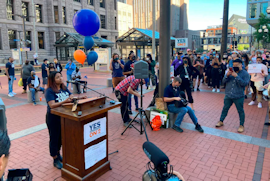|
What Started the Nation's PD Defunding Movement
"All Eyes Are On Minneapolis" PD Reform Vote in Two Weeks
A ballot initiative on reforming the police after George Floyd’s death is
tearing Minneapolis apart
While some progressive activists support the measure, others — including many
Black leaders — say it’s too vague and will only exacerbate the city’s violent
crime spike.
 But
even as Floyd’s murder sparked urgent calls for police reform, the question of
how to get there has exposed deep divides across Minneapolis,
exacerbated by a spike
in violent crime. A
Nov. 2 ballot question that would dramatically reshape the size and scope of the
Minneapolis police force has fractured the city even more in the first major
electoral test of the police reform movement since Floyd’s death. But
even as Floyd’s murder sparked urgent calls for police reform, the question of
how to get there has exposed deep divides across Minneapolis,
exacerbated by a spike
in violent crime. A
Nov. 2 ballot question that would dramatically reshape the size and scope of the
Minneapolis police force has fractured the city even more in the first major
electoral test of the police reform movement since Floyd’s death.
City Question Two, as it is known,
would
amend the Minneapolis charter to allow the
police department to be
replaced by a Department of Public Safety
overseen by both the mayor and city council. The Department would take a
“comprehensive public
health approach” to safety, including
the dispatch of mental health workers
to certain calls and more investment in violence prevention efforts.
If approved by voters, the initiative would
remove decades-old
language from the charter requiring a minimum number of police officers
based on the city’s population. The new department “could include” police
officers “if necessary” — wording that has left
some residents afraid the city would descend into lawlessness.
Authors of the proposed charter amendment insist armed officers wouldn’t
entirely go away, because they are mandated by Minnesota law to respond to
specific calls. “We’re still going to have police,” said JaNaé Bates, a Black
reverend and leader of Yes 4 Minneapolis, a coalition of labor, religious and
racial justice groups that wrote the question and gathered more than 20,000
signatures to get it on the ballot. “What this does is give the city more
flexibility in how we approach safety.”
&uuid=(email))
But the measure’s critics say the initiative’s wording is intentionally vague,
leaving out the words
“defund” or “abolish” to obscure its true meaning. “This
amendment is about abolishing the police,”
said Sondra Samuels, a Black activist from north Minneapolis who was part of a
group that unsuccessfully sued to get the question off the ballot. “It has
nothing to do with safety and systemic change.”
The ballot question comes after a
majority of the Minneapolis City Council took the stage at a rally days
after Floyd’s death and pledged to dismantle the police department — a dramatic
statement that reverberated across the country, becoming an issue
in political races big and small.
“All eyes are on
Minneapolis,” said
Mayor Jacob Frey, who is simultaneously running for a second term in office and
against the charter amendment on policing, which
he argues will send a
city already struggling with violent crime into further distress.
“We need deep structural reform and change … But here in Minneapolis, we have
the fewest officers per capita than just about any major city in the entire
country,” said Frey, who currently has sole oversight of the police department
as mayor. “The notion of further reducing our officer count just does not make
sense.”
The debate has also
drawn attention from outside the city — sharply dividing state and national
Democrats along ideological lines in an election that could have implications
far beyond Minneapolis as the party looks to the 2022 midterms and the 2024
presidential race.
Less than two weeks before Election Day, people on both sides of the ballot
question say things remain unpredictable, pointing to private polling and data
from citywide canvassing that suggests residents are deeply split on the
question — with many still undecided even as early voting has begun.
In one of the few public surveys on the issue, a
September poll of 800 Minneapolis likely voters by the Star Tribune,
Minnesota Public Radio, KARE 11 and PBS’s FRONTLINE found that 49 percent of
those surveyed supported replacing the MPD with a new department of public
safety;
41 percent were opposed
while 10 percent were undecided.
Yet
55 percent
of those polled also said Minneapolis
“should not reduce” the
size of the police force
— including
75 percent of Black
residents and 51 percent of White residents who were surveyed.
The uptick in crime has coincided with a slowdown in police response, which the
department blames on staffing shortages. Since Floyd’s death on May 25, 2020,
nearly 300 officers have left the department — many claiming post-traumatic
stress disorder from the fiery protests that erupted after his killing.
According to numbers presented to the city council this week, a total of 588
officers were working at the department as of Sept. 30 — down from the 888
positions that had been funded last year.
washingtonpost.com
|